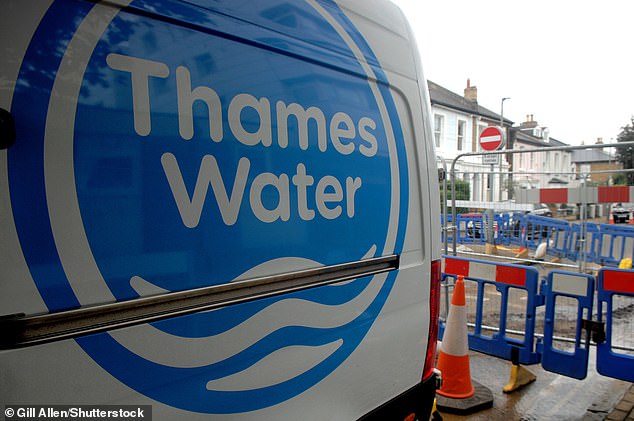Table of Contents
Thames Water, Yorkshire Water and Dŵr Cymru Welsh Water have been prevented from using. clients’ money to pay £1.5 million of executive bonuses.
Nine water companies will not use customer money to fund bonuses as Ofwat’s new rules on executive bonuses come into force, the water regulator said on Thursday.
Ofwat said it had intervened to stop companies that cannot prove bonuses are sufficiently linked to performance from using customer money to fund payments, which account for 73 per cent of total executive awards, valued at £6. .8 million, proposed throughout the industry.
Six companies voluntarily decided not to pass on the cost of executive bonuses worth a combined £5.2m to clients, and shareholders paid instead.
Ofwat said it would otherwise have taken action to block the payments.
Water companies paid a total of £9.3 million in executive bonuses during the last financial year.
Blocked: Ofwat has blocked Thames Water, Yorkshire Water and Dŵr Cymru Welsh Water from allowing their customers to pay £1.5m in executive bonuses.
David Black, chief executive of Ofwat, said: “By preventing customers from paying for undeserved bonuses that do not adequately reflect performance, we seek to sharpen the mindset of executives and put pressure on companies to improve their performance and culture of accountability.” .
“While we are starting to see companies take some positive steps, they need to do more to rebuild public trust.”
Ofwat said new rules on water company bonuses and paying dividends to shareholders were “beginning to take effect” in their first full year since their introduction.
By blocking awards, Ofwat will adjust companies’ costs so that they cannot recover sums from customers.
It revealed that Thames Water – with debt of more than £16bn and at the center of growing public outrage over pollution and rising bills – planned to use customers’ cash to pay £770,000 in bonuses for its director. executive, Chris Weston, and its financial director, Alastair. Cochran.
Action was also taken against £616,000 in payments to top bosses at Yorkshire Water and £163,000 in bonuses at Dwr Cymru Welsh Water.
Secretary of State for Environment, Food and Rural Affairs Steve Reed said: ‘It is disgraceful that half of water companies have awarded unjustifiable and undeserved bonuses.
‘That is why this Government is introducing urgent legislation to ban the payment of unfair bonuses to polluting water bosses so that payments of this type never happen again.
“But there are deeper problems that need long-term solutions, which is why we have launched the biggest review of the sector since privatization.”
Today’s statement from Ofwat comes at a time of growing public and political pressure on the sector to address poor performance on wastewater pollution and leaks amid rising customer bills.
Ofwat said it could block bonus payments entirely under the new water bill being launched by the government.
The regulator also published its latest report on the resilience of water companies, showing £1bn in dividends paid to shareholders in 2023-24, although this was £400m less than the previous year thanks to a “clearer link” to performance.
In the report, it says Thames Water, South East Water and Southern Water need action to address big holes in their finances.
This means the three companies are subject to high-priority monitoring and cash blocking measures, preventing them from paying dividends without regulator approval.
A further seven companies have been declared to have “major concern” about their financial resilience, while six companies are considered “standard”, with no specific concerns about their financial health.
Black said: ‘Our new rules on executive pay and dividends link both to company performance.
“Through these new rules, our enforcement actions and our incentives regime, which has imposed £430 million in performance penalties since 2020, we are challenging businesses to deliver improvements for both customers and the environment.”
Water watchdog Ofwat is expected to confirm in December how much it will allow water companies to increase their bills over the next five years.
On Wednesday, Severn Trent revealed it almost tripled its profits in the first half of its financial year and also failed to meet a key drinking water safety standard.
The utility, which supplies water to 4.6 million homes and businesses in the Midlands and Wales, said it will not approve the so-called compliance risk index, a metric that indicates whether companies are treating water in accordance with regulations. regulations.
Severn expects to “be penalized” in the metric, largely as a result of problems at a treatment plant in Strensham, Worcester, where it said it has introduced a new disinfection scheme.
DIY INVESTMENT PLATFORMS

AJ Bell

AJ Bell
Easy investing and ready-to-use portfolios

Hargreaves Lansdown

Hargreaves Lansdown
Free Fund Trading and Investment Ideas

interactive inverter

interactive inverter
Fixed fee investing from £4.99 per month

sax

sax
Get £200 back in trading fees

Trade 212

Trade 212
Free trading and no account commission
Affiliate links: If you purchase a This is Money product you may earn a commission. These offers are chosen by our editorial team as we think they are worth highlighting. This does not affect our editorial independence.
Some links in this article may be affiliate links. If you click on them, we may earn a small commission. That helps us fund This Is Money and keep it free to use. We do not write articles to promote products. We do not allow any commercial relationship to affect our editorial independence.



